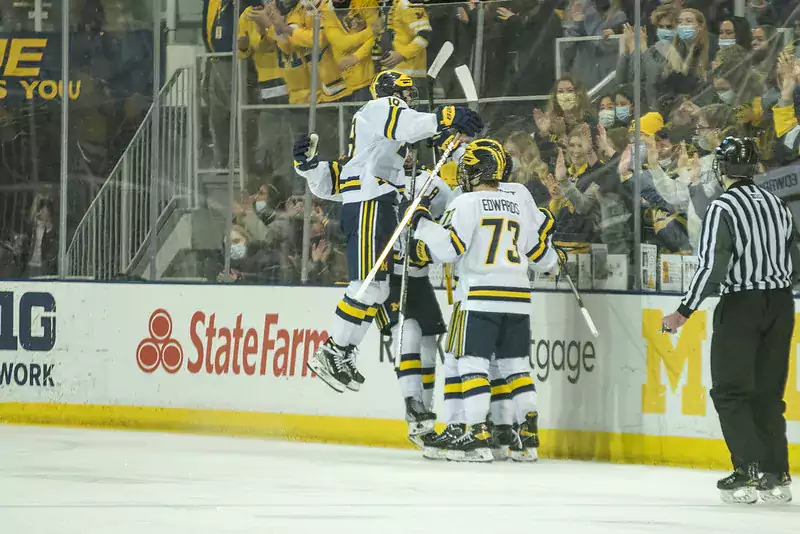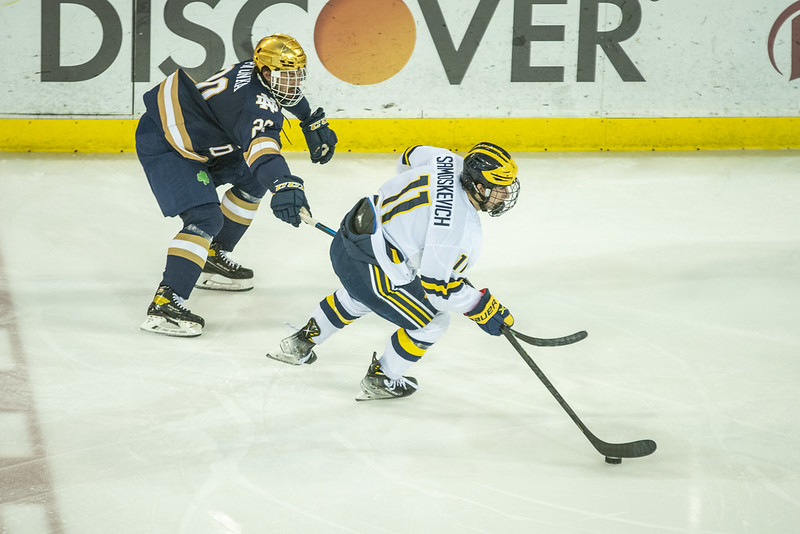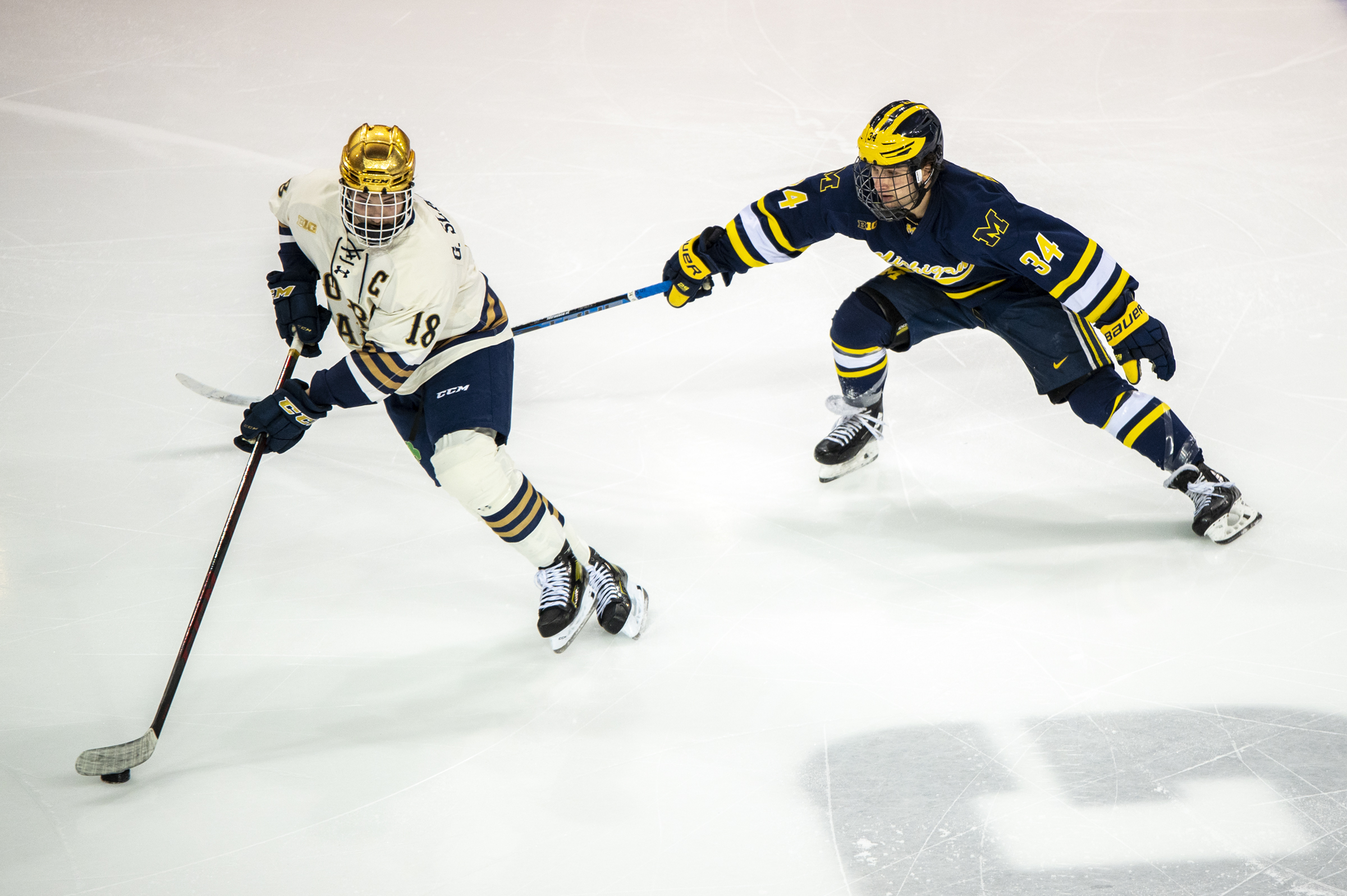notre dame hockey is the worst

3/12/2022 – Michigan 2, Notre Dame 1 – 28-9-1 (16-0-5-3 B1G)
Hockey is a sport where the flow of the game hinges on energy level. Brian called basketball "a game of runs" in a column last year, and I don't think hockey is dissimilar. The only twist is that because hockey is such a low scoring sport, the best way you can tell who is in the midst of a "run" is through watching the game. That, or tracking shot attempts on a minute by minute basis. One team will start racking up the chances, then they commit a penalty, and suddenly the other team gets a power play, and they also get the opportunity to go on a run after it ends, even if they don't score on it.
Those runs are driven by energy level, when one team's skaters just have a little more jump in their step than those on the opposing team. They start winning more puck battles, look more tenacious on the walls, and seem a bit faster on the rush. When the other team is strangling your team, it's up to your skaters to pick up the energy level to try and match them. I've been writing about hockey strategy on this site for over a year now, and have studied it for far longer, but one thing I've learned is this: you can study the strategic and systematic component to the sport all you want, but the X's and O's only matter so much if your energy level as a team isn't matching your opponent's. That's why if you ever watch clips of hockey coaches mic'd up behind the bench during a game, they rarely are saying "you know what guys, we need to adjust our neutral zone forecheck to have F1 go a little lower towards the goal line" with a whiteboard out. Instead they're barking things like "we're dragging now! They're kicking our ass! Wake the fuck up and COMPETE." Energy level, baby.
Michigan rose their energy level on Saturday night. They came out guns blazing in the Friday game against ND back in late February, but that game saw ND quickly tie it and then things went sideways. In the second game of that series, Michigan's energy level was middling as they were committed to playing a tight, mistake-free game. That worked okay for awhile, until they made a mistake in the second period. Neither of those formulas were the right one to crack the Irish code, and so Saturday they came up with a new plan: just outwork Notre Dame for nearly the entire 60 minutes. Right out of the gate, Michigan was competing at a higher level than they had at any point previously in the season against the Irish.

[James Coller]
The Wolverines were winning nearly every puck battle in their own zone throughout the entire first 25 minutes of the game. They disrupted Notre Dame's flow through the neutral zone, won the battles when the dump ins came, and were able to force play in the Notre Dame half of the ice. They seemed much more prepared for this sort of game than the last time around, knowing that they had to shoot more often, even if many were going to be blocked by Notre Dame's defensive positioning. Michigan was willing to do so, because they had the jump in their step to win a good amount of the ensuing puck retrieval battles. Energy level.
The result was a 1st period that saw Michigan dominate the shot attempts tally. Notre Dame got one good look on net, and Portillo made the save. Otherwise, it was all Michigan. They did the same thing early in the second, looking faster and more determined than their opposition, like they wanted it more. The Wolverines finally got the goal to go up 1-0 off a brilliant rush chance finished by Matty Beniers and Brendan Brisson. But that's when the energy level shifted, as it often does. Notre Dame picked their level up, and started battling. They got some generous help from the Puck Luck Gods and were able to cash in a chance off a long cycle possession that was extended by Michigan's clearing effort going off the referee and staying in the zone.
But Michigan came right back. Notre Dame had found a way to match the Wolverines' energy level, and Michigan responded by finding a way to want the victory more. Their play and compete level found a new notch, and pummeled Notre Dame in the third period. Shot attempts were as lopsided as the first period, Michigan got the go-ahead goal, and then the Irish got nothing the entire rest of the way. Needing to put away a game, the Wolverines continued to skate circles around Notre Dame and suffocated the Irish offense until there was no time left. Shot attempts in the third period were something like 20-4 in favor of Michigan, and for the game they were 84-37 at even strength.
[AFTER THE JUMP: More narrative, HockeyBullets, and PWR]

I was out of town this past weekend, having planned the trip a few weeks back on the assumption that Michigan Hockey would would finish first in the B1G and thus have a bye. It was a risky assumption, but I bet on the boys going into South Bend at the end of February and getting the job done. As we discussed last week, that did not happen. Still, despite having to play this past weekend, the Wolverines essentially got a bye: they got to play Michigan State. I don't love kicking teams when they're down, but it's absolutely deserved after the Spartans failed to beat Michigan again, falling to 0-6 on the season against their rival and possibly ending the Danton Cole Era in East Lansing.
Because there's not much to say that hasn't already been said about Michigan beating MSU into the dirt, I'm only going to list a few bullets about the actual on-ice games (many of the notes are more about season stats than about these games). After that we're going to delve more deeply into NCAA Tournament seeding, and then we'll preview Notre Dame (again).
HockeyBullets
- Michael Pastujov is having an under-appreciated (super)senior season. This is a point I made on the HockeyCast (which will be released tomorrow), but buried below all the young stars on the Michigan roster is one of the oldest guys on the team, Mike Pastujov, who is quietly having a very nice season. He's got a 10-14-24 line in 37 games, very solid middle six forward production and it's especially nice to see from a winger who struggled in his career prior to 2021-22 to be a consistent producer. Pastujov would be in and out of the lineup, shuffled on different lines, and could never be considered a productive piece. That has changed this year, where he is one of three players to play in every game for Michigan, and has been a reliable goal producer, playing comfortably with more talented players in Michigan's top nine.
Another under-appreciated element of his game is the defensive component Pastujov brings. He's not a checking grinder like a Van Wyhe or Moyle, but Pastujov's defensive positioning is very strong, he can help kill penalties, and plays a 200-foot game. I like him playing with Thomas Bordeleau because those guys are both good two-way forwards who provide a difficult front for the opposition to penetrate. It's been a nice year for Pastujov, who deserves recognition, and hopefully he gets to return to the Frozen Four, being the last member of the 2018 Frozen Four lineup to still be in the program (Luke Morgan was on the team but was not an active player, sitting out his transfer-mandated year).

Samoskevich has come on strong [James Coller]
- Mackie Samoskevich could be a superstar as a sophomore. We haven't talked enough about Samoskevich this year, as he's also gotten buried below Beniers, Johnson, Brisson and Bordeleau. It took him a little bit of time to get acclimated to college hockey as a freshman, but since the start of 2022, Samoskevich has been terrific: 5-10-15 in 16 games. He's found a role that suits him next to Dylan Duke and Johnny Beecher, two players who are willing to be a bit more physical than him, with Duke offering the ability to play around the net and Beecher offering the skating ability to mesh with Samoskevich's legs. That line has been excellent since the Olympians left for China, and they have kept it rolling into March. And make no mistake, Samoskevich drives that line. He can really fly, is a good passer, and man is his shot sweet:
Mackie Samoskevich an absolute rocket 🚀 pic.twitter.com/ij55PUk8xI
— Michigan Hockey (@umichhockey) March 5, 2022
Samoskevich is now 8th on the team in points with 26 and if you look at the guys ahead of him, most won't be here next year, while it's widely assumed that Samoskevich will get a 2nd year in Ann Arbor. If he does, watch for him to be a 1st team All-B1G type player while leading a top line next to incoming freshmen forwards like Frank Nazar III, Adam Fantilli, and Rutger McGroarty.
[AFTER THE JUMP: Pairwise!]

2/25/2022 – Notre Dame 4, Michigan 1 – 25-8-1 (16-4-0-3 B1G)
2/26/2022 – Notre Dame 2, Michigan 1 – 25-9-1 (16-5-0-3 B1G)
Playing Notre Dame in hockey is a decent microcosm of what it's like to play any team in the NCAA Hockey Tournament. In my five years covering the Michigan hockey team, one thing has always been true about playing Notre Dame: you have to get the first goal in order to have a good chance of winning. If you get the first goal, you force Notre Dame to open it up. They have to send defensemen up in the neutral zone, they have to be more aggressive pinching at the point in the offensive zone, and thus are more exposed to the sorts of 3v3 entries or even odd-man rushes that Michigan has become so reliant on as Mel Pearson has built his roster exclusively around NHL caliber talent. If you score first, your probability of scoring 3 or 4 on the Irish goes up considerably.
If you don't score first, your chance of scoring 3 or 4 plummets like a couch thrown from a tenth story window. Notre Dame plays impeccable in-zone defense when they're allowed to focus on their defense (i.e. when they have the lead). Some people make comparisons to Michigan State in terms of putting bodies in the defensive zone, but that's where the similarities end. MSU just parks guys in front of the net, makes no attempt to cut off passing lanes or shooting angles, and doesn't pressure the puck carrier. They put out five bodies and let the opponent shoot 60 times. That's not a winning formula, and it's why MSU has sucked under Danton Cole.
Notre Dame, on the other hand, does all the little schematic things necessary to actually shut you down. The five bodies in the neutral zone aren't corpses stacked in front of the net, they're stationed in specific positions designed to cut off all high danger passing lanes while also taking away any good shooting angles. Notre Dame blocked 44 shots this weekend between the two games, and the number of passes they intercepted has to be even higher. I wrote last week about how good Michigan's defensive positioning was in the final minutes of the Ohio State game, but if you want to see the true MasterClass session on how to position your skaters perfectly in the defensive zone, then it is Jeff Jackson and Notre Dame you need to watch.

[Zoey Holmstrom]
The Irish have been like this forever. As long as I've been covering college hockey, and well before it. I joked to David and Brian on Friday night while watching the game that the names on Notre Dame's roster are irrelevant. If you give me a list of names from Ohio State or Minnesota or Michigan State's roster from a few years ago, I can tell you who is still in college and who is long gone. Scott Reedy? Off to the NHL. Sammy Walker? Somehow still at Minnesota. Taro Hirose? Gone. Mitchell Lewandowski? Still at MSU. But you could list off the roster of Notre Dame from two or three years ago and I'd have little or no idea which guys are still in college and which guys aren't (outside of the goalies), because no players on their team stand out.
Notre Dame doesn't have shining stars or big names, it's just 19 skaters who all wear the same color jerseys and helmets, with no distinctive features. They're robots programmed to be in the right place at the right time in the defensive zone if they have the lead, to use their sticks perfectly to obstruct passes, to block shots, and to forecheck well. It hurts their ability to get a high end NHL-caliber forward in the recruiting market (hello, Rutger McGroarty/Logan Cooley), but this weekend I don't think it was the team with all the high end NHL-caliber forwards that was laughing.
That's the trap Michigan fell into this weekend. They got the first goal on Friday, couldn't scratch out a second when they had Notre Dame out of the comfort zone, got unlucky on a bad bounce that tied the game up, and then forked over the lead thanks to a Johnny Beecher five minute major and Erik Portillo making one of the biggest gaffes of the season handling the puck. With 35 minutes to play on Friday, Michigan was behind. Uh oh. On Saturday, the opening goal didn't come until midway through the second when two disastrous defensive plays by Nick Blankenburg and Luke Hughes gave up a rush chance that ND scored on to go up 1-0. Uh oh.

[Zoey Holmstrom]
The problem with falling a goal down to these guys is even if you manage to scratch out the equalizer (as Michigan did on Saturday), it typically takes you so long to get the goal that it gives you little time to snag another before regulation runs out (hence why ND has played so many OT games). Michigan needed a regulation win on Saturday and likely weren't going to get it, even if they didn't get colossally f***** by the referees in the final three minutes (more on that later).
Michigan went into South Bend needing at least four points for a share of the conference title and came away with a goose egg. Their power play looked stale and toothless against the top notch ND penalty kill, Michigan struggled physically against a Notre Dame team that was finishing every check, looked bamboozled when having to penetrate the ND defensive structure, and appeared unprepared to deal with this sort of team. Considering that Notre Dame is a conference opponent they've already played before this season and not some non-conference foe Michigan sees once in a decade, the lack of offensive preparation was concerning.
The two teams Michigan has struggled against the most this season (WMU and Notre Dame) are both teams that love to hit and engage physically. They're also the 1st and 8th heaviest teams in NCAA Hockey based on average weight, per CollegeHockeyNews. It is reasonable to think that the blueprint on how to beat Michigan has now been written: push the Wolverines around physically, slow them down in the neutral zone, and take away passing lanes in the defensive zone. And of course, have a good goalie. There aren't too many teams that can do all those things, but at least a few already exist and have had good success. Michigan will need to figure out how to solve this problem, and doesn't have too long to do it. Only a month remains until the NCAA Tournament, and they'll likely need to beat Notre Dame in two weekends to have a shot to raise any sort of B1G hardware.
[AFTER THE JUMP: HockeyBullets]
31